Chris Baty's Blog, page 265
May 13, 2011
For the Love of the Game

I learned the game of backgammon at my Pappy's knee. I spent much of my childhood watching him play for some pretty high stakes and then I went on to become the Backgammon Champion of my high school. Okay, that's not all true. You know those icebreaker games where a person shares three "facts" about themselves and everyone guesses which one is false? This is a bit like that.
The truth is, I called my old man Pops, not Pappy, and I never finished high school. I did play in a high-school backgammon tournament before I left, though, and came in… second. Flashback to the third game of the final round—I'm wearing peg-legged jeans and crazy bangs and I'm one roll away from taking home the prize when I'm defeated by Tim Wilkinson and a much-needed roll of doubles. Tim's backgammon career took off after that—I think he won a scholarship to State, but I'm proud to say that I'm still playing in the minors.
Since Tavia had said she wanted to learn to play, I brought in my board and set it up in the conference room today. The board belonged to my Pops before it was mine and as I was summarily beating Dan at a quick game during lunch, I had time to reflect on my history with the smooth men (the pieces are called "men," my history with actual smooth men is a completely different blog post), the dice, the doubling cube, and why I love this game: backgammon is the perfect mix of skill, luck, and bravado. Even the most seasoned player can be beat by a newbie on a lucky streak and a lucky streak can almost always be erased by some well-timed talking of the trash.
A mysterious combination of skill, luck, and bravado carry the day in my writing life as well, as do most of the lessons I learned playing backgammon with my Pops. When he and I played together, he took the game even more seriously than on his gambling nights because, I realize now, the stakes were higher. The prize when we played was raising a confident child. Pops taught me the importance of losing with grace and not being afraid to try again, and more than that, he taught me to roll the dice with a sense of humor and to know that the only next step, win or lose, is to set up the board for the next game.
These lessons help me through those challenging writing moments, which are many, and every backgammon loss, which (need I say it?) are few. I'd love to hear what lessons, learned at your Pappy's knee or on any playing field, help you through your writing wins and losses! Who's up for a game?
May 12, 2011
Looking Back: What I've Learned as an OLL Intern
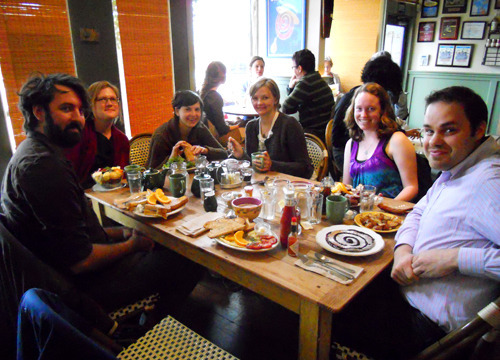 We asked long-time intern Candace to share a few thoughts on her—sob—last day in the office. (But first we plied her with lots of delicious brunch food, as seen above.)
We asked long-time intern Candace to share a few thoughts on her—sob—last day in the office. (But first we plied her with lots of delicious brunch food, as seen above.)
When I began interning for the Office of Letters and Light in September 2007, I had just started my freshman year at UC Berkeley. I was a two-time NaNoWriMo winner at that point, and I jumped at the opportunity to support an organization that had already helped me produce 100,000 words of questionable prose and my first attempt at a stage play.
A lot has happened since then—but four years, 330,000 more words of questionable prose, and 2.5 scripts later, I'm still in love with what we do, and more than a little sad to have to leave. In less than two weeks, I will graduate from Berkeley with a BA in English and move back home to Southern California for the summer. In the fall, I'll be heading to New York to start a PhD in English at Columbia University.
I'm obviously excited about taking this next step, but I'm not quite ready to move forward without taking a moment to look backward at the things I learned as an intern here, and the things I'm going to miss.*
If you're not having fun, you're not doing it right.
After having worked here for three years, I feel like this is an unspoken office philosophy. It shows up in the events we run—which, the way I see them, are all about letting yourself have fun with writing in a way you might never have done before—but it's also present in the day-to-day goings-on within the office. Helped along by important office traditions like pie days and Friday Jams, and encouraged by mascots like Tom Selleck and Blobby the Dinosaur, we do our best to make work fun. Even entering data into a spreadsheet is exciting when accompanied by the melodious strains of Toto's "Africa"—and I speak from experience.
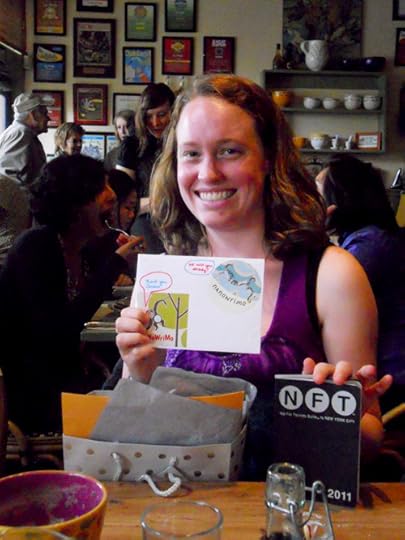
Insanity is better with company.
And I'm convinced the company here is the best. It's not just that the staff is friendly. After enough time working together in the same office, everyone really is friends. Sometimes, we have to do real work—and as an intern I've engaged in my fair share of menial labor—but even during the craziness that accompanies October and November in particular, it's comforting to know that we're all rooting for each other, coming together in a team effort to get this done.
If this, what else?
Working here has ultimately taught me to believe in the power of a group of creative, motivated people to do whatever they set out to do, and more. If we can do this, think of all of the other amazing things that people can do. If I can be part of something like this, what else can I go on to accomplish? (In case you're wondering, the answer is "anything.")
*I initially considered making a second list of the things I'll miss, but decided that "everything except for assembling teacher kits" probably covers it.
May 11, 2011
Everything Must Go
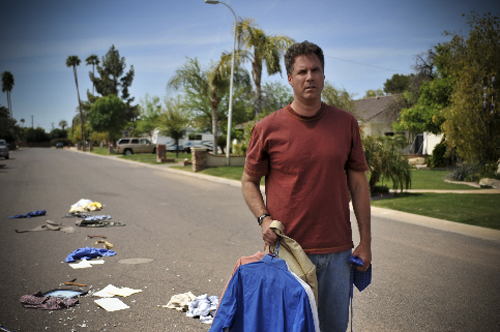
A few of us have written about movie adaptations on this blog—most recently Water For Elephants, which the office took a field trip to see last month. But, I am really intrigued when short stories get turned into movies. There are quite a few, including 2001: A Space Odyssey, Brokeback Mountain, and Minority Report. Check out a whole list here. And I wonder, how does a screenwriter expand a short story into a full-length movie?
I was thinking about this because of the new movie Everything Must Go, which is based on a Raymond Carver story. After watching the trailer, it seems that there have been a lot of drastic changes from the short story. (You can read the entire Carver story here.) The writer/director, Dan Rush, has apparently added additional characters and scenes, and the main character develops deeper relationships with other people. The whole story runs about 2,100 words, so it makes sense that it would need to be expanded to work as a film. But it seems like it would be incredibly difficult to decide what to expand on without knowing the author's intent.
I'm looking forward to seeing this one, and figuring out how the story worked as a jumping-off point. What other short story-to-film adaptations have you seen? Which ones work, and why? Which ones definitely don't?
May 10, 2011
High School Guide to the NaNoWriMo Life

Last week, NaNoWriMo founder Chris Baty went to speak to the students of Mercersburg Academy in Pennsylvania. In preparation for his trip, he asked our own high school blog readers to share their words of wisdom about persevering through November. As Young Writers Program director, I was so impressed by all the advice you shared. I decided to compile a few of the most interesting bits in one place, so I could send it around to educators this fall. Consider it a "High School Guide to the NaNoWriMo Life."
What's your favorite piece of advice from these high schoolers? And if you never got a chance to do NaNo while in school, what do you think would be the most challenging part? Tell us in the comments!
Getting Started
"My advice is to come up with plenty of novel ideas, but pick one that you absolutely adore." – Jamie
"A little planning goes a long way, especially when you're a senior in high school. In class, I would write up notes about my novel, and I would type the story out once I got home. Stick to the calendar, especially if it's your first year. You don't want to get burnt out." – Manzana Flash
Keeping At It
"During the entire month, just keep reminding yourself that you're writing a novel. Put the website as your homepage, use the logo as your picture on the social networking sites, keep the file for your novel open at all times. If the idea is always there, then you'll find that the story comes out easier when you're actually writing." – Catherine
"I think the best advice I could give a high school student would be: don't be afraid to change your mind, and don't be afraid to suck. If you don't like your story or your idea or a character, change it. And just write whatever comes to mind, because you can always edit sucky bits later." – manictheatrefan
"Don't make it good, make it exciting. Write cliff hangers galore! If you end a chapter on a ridiculous note that you have no idea how you'll resolve in the next chapter and is really exciting and kind of cool, you'll have plenty of fodder for the next chapter." – Owly
"You just have to remember that no one is grading you on it! It's not an assignment, and no one else is necessarily going to read it. Writing sucky prose goes against basically everything they've taught you, but the prose is going to suck and that's okay. Just keep going." – Kara
"You'll have plenty of time to edit it before you send it off to someone else. And for his or her (or their) sake(s), please edit it before you send it. Even English teachers make typos. Sometimes lots of typos." – Kayla Clark
The Writing Life
"People think that because writing's not like football practice, you can just drop it at any point, but it is our football practice, so we've gotta stop ourselves and write." – Leigh-Anne Anderson
"Make sure that you are able to set aside time every day regularly to write. I myself write from 8-10 on all days, so at that time my brain switches on and goes 'Hey! I gotta start now!' and words flow easily." – Lectin Gaezat
"Write on the bus, in between classes (I wrote during classes, but I would feel guilty to suggest that. My biology teacher still cringes and glares at me whenever I get out my little red notebook). Write when you get home. In between homework assignments. During lunch. And while you're at it, see if you can get some extra credit." – Enna-Isilee
"Also, notebooks are your best friend; keep one handy at all times." – Spottedleopardgirl
"Real Life"
"If you have a big paper due in November or something like that, plan ahead to give yourself a 'day off' from NaNo the day before so you can focus on finishing that. You'll feel less overwhelmed this way." – J Gleason
"Thanksgiving was my saving grace both years—football held no interest to me. What I also found helpful was background noise. I wrote to the same nine episodes of Good Eats played over… and over… and over… I'm pretty sure I can quote them word for word." – Lydia_Trebond
"Make sure you get enough sleep. That is vital for your overall health, state of mind, and schoolwork, not to mention the quality of your novel." – Kayla Clark
"You need to know when to pack it in. If it's 3:00 AM and you've been staring at a blank page for an hour and a half, go to sleep." – Kara
Friends and Family
"I made sure to let everyone—friends and family—know that I was doing this, but it only took a few people to give feedback to really keep me in line." – Kyle
"Find or force a friend to participate with you. True, the actual novel-writing experience is solitary, but the wailing and bemoaning and despairing is an experience best shared." – Jamie
"A rewards system also works wonders too. I kept in touch with my friends my making sure I hung out with them in school as well as reporting major milestones on Facebook." – Rida Vaquas
The Results
"Even if you got 5,000 or 15,000 or 50,000 words in November, don't forget that you tried and that you have a great start to your story." – IvyJ
"You'll write at your own pace. You may not finish; you may finish with double or triple the word count. You may like what you write; you may not. You may only like bits and pieces. You may never read anything of it again. Whatever. NaNo is about the experience, so let it happen." – Mary Rose
"It was one of the best experiences I've ever had and it's given me so much confidence in my writing and in just about anything I try. I mean, come on, if I can write multiple novels before my 16th birthday, then what can't I do? Well, there's driving, but what else?" – Emily Vork
"All I can say is writing a novel during high school was the best decision I ever made." – DAW
May 9, 2011
Failure to Pants
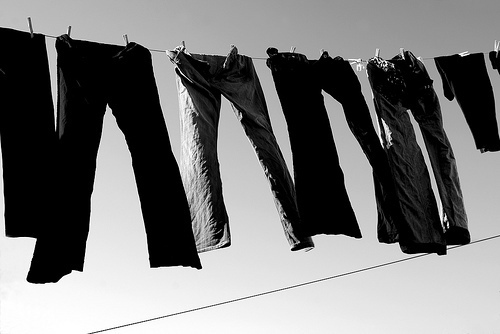
I have written (at length) about my fondness for planning when I write. I love the notebooks, the pens, sitting down, and seeing a whole story tumble out in short form, coming to the sections that I know I will love to write. I am a dedicated outliner, and I have embraced that side of myself. (It's also the side that gets a little Monica Geller-ish at times. "Rules help control the fun.")
So I should have known that when I set out to attempt Script Frenzy with only the loosest of ideas ("Romeo and Juliet, but with dinosaurs! Also, singing.") that it wasn't going to go well. After some hilarious riffing over on Twitter and Facebook, I had a few ideas for songs, but that was about it. (The highlight: my friend Colin's suggestion that a dance number would be a "Dance Dance Evolution.")
There were moments when it worked out fine. I did have an outline of sorts, since I was loosely following the structure of Romeo and Juliet, and a couple of times when I got into a groove I wrote some sections that were, in my humble opinion, hilarious. But overall, every time I sat down to write, I felt like I spent most of my time flailing around trying to figure out what to write next. I know that's what people enjoy about pantsing—discovering the unexpected, letting your imagination take the lead, writing random hilarious things—but it just doesn't suit me. I like knowing what's going to happen next.
Maybe that explains why I don't like surprise parties.
The more I think about it, the more I come to terms with the fact that how I write is just an extension of my personality. I like being the one in charge, the one who knows what's happening. This makes me kind of bossy and really annoying when someone won't tell me something, but it also means I'm a great vacation planner and an excellent person to have around in a crisis. Being logical is not a bad thing. I've embraced it in the rest of my life, and I think it's time to accept it in my writing life, too.
I do envy the pantsers sometimes, though, just like I sometimes envy the people who can get on a plane and see where adventure takes them. I think, however, it's time to accept that I will never be one of them.
Awesome pants image by Flickr user José Antonio Galloso
Wanted: Knives, cunning, and a canapé or two

I don't watch a lot of TV. Don't get me wrong—I enjoy the tube as much as the next person. I just have a hard time planting myself for more then three minutes at a time (unless I'm in bed with my book).
So when I do flip on the TV, I usually do so with intention. I can pretty much guarantee I am either watching sports or a cooking show. Not just any sports or cooking show, though. It'll be baseball, soccer, or tennis; Top Chef, Iron Chef, or Mexico: One Plate at a Time. I'm fussy like that.
Lately, though, I've been despairing because the new season of Top Chef Masters is really not doing it for me. The new cast of judges is pretentious and petty, the challenges are absurd, and it's painfully clear that the whole rodeo isn't worth these talented chefs' time or effort. (At least they are competing for charity. That is a saving grace—and an important one.)
I am five episodes in now and thinking I may need to trade this hour of programming for another. Seeing as I clearly have an affinity for competition-based reality programming, what would you recommend I watch instead?
My kitty thanks you for your input. (TV watching is the one time during the day that I am at home and sitting. He likes that.)
Photo by Flickr user John Loo
May 6, 2011
No Fences!
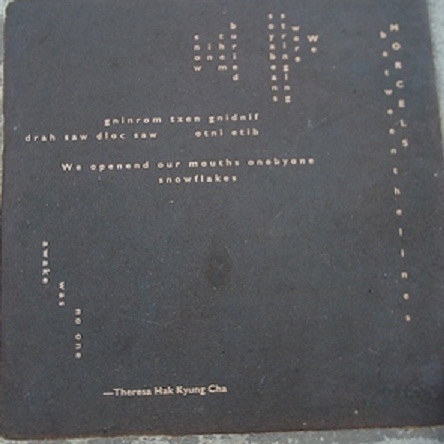
I've been thinking about how we aren't born being taught how to paint or sculpt or play the tuba but from the gate (the baby gate!) we are taught to use the awesome artistic tool of language. We use words every day and with some success, right? We share ideas, come to some agreements, make it home again. So when does our workaday use of this fantastic tool slip into the artistic? When do we start using those everyday words to make magic instead of a grocery list and what made us think we could do such a thing?
As I'm reading more about Theresa Hak Kyung Cha's too-short life in The Dream of the Audience, a collection of essays about her work, I'm thinking hard about the impact of language on our perception of ourselves and our supposed limitations. This idea is at the forefront of much of Cha's work, as you can see from this picture of Cha's square on the Berkeley Poetry Walk (right around the corner!). Cha is one of the first artists whose use of language let me know that I could, in fact, do absolutely anything I wanted with it. She lifted the fences I'd unknowingly put up and, basically, cracked open my mind to its own possibilities.
I'd love to know, whose work has done this for you! What writer gives you a passport to your own writer-ly freedom? It doesn't have to be a writer, either—what about a musician whose use of words catches your ear? Maybe Tupac sets you free! Maybe it's your uncle's slang that gets you going! Who uses words in a way that cracks open your brain and makes you want to start writing some down?
A Debate About What to Debate

Sarah: You may not be able to tell from our good-natured blog and generally sunny dispositions, but we here at the Office of Letters and Light are a competitive bunch. Since the internet has taught us that controversy leads to page views, Chris A. and I decided we should make our blog debates into an ongoing series, guaranteeing the most popular posts on the blog and securing our positions as Blog King and Queen.
We had a lot of great ideas about what we could debate, but as our discussions on the subject progressed, we ran into a bit of a problem.
We agree on nearly everything.
Even the guaranteed hot-button topics. Mac vs. PC? We're both team Mac. Cake vs. Pie? How is that even a question? Clearly the answer is pie. I guess we did pass over one key internet debate: Chris, where do you fall on Team Edward vs. Team Jacob?
Chris: Hi, Sarah! You're We're right, pie is so much more delicious than cake. In fact, I favor nearly any other baked dessert. I do have a soft spot for pineapple upside down cake, though. (I assume you feel the same.) What did you serve at your wedding? Maybe I can retroactively question your nuptial decisions.
But, on to your question. Not being a "Twi-Hard" or a "Twilight Mom" or any other type of person with an understanding of the franchise, I must base my thoughts on tangentially related evidence:
Werewolves are infinitely cooler than vampires. Do vampires play high school basketball? I don't think so. Also, it takes a silver bullet to kill 'thropes (as I call them). You got any of those lying around your house? I sure don't. But I could easily grab some garlic from the cupboard, carve a crude stake, and be pretty chill when a vampire comes creeping. So, decision made: Team Jacob. Surely you can't disagree with this airtight logic?
Now let's get crazy… Rank the Toy Story films. Go!
Sarah: You know, we were totally planning to have wedding pie, but then we found out we could have a cake shaped like a book, so we had rehearsal dinner pie instead. But I do have birthday pie every year! Birthday cake is for suckers.
I'm actually on Team Neither, because it bothers me that the heroine of a book is defined entirely by the men in her life. But I can get a little ranty about the feminist issues in the Twilight saga, so let's move on.
Asking me to rank the Toy Story movies? That's like Sophie's Choice! I have loved the original Toy Story since high school, and I can quote almost the entire thing. (I use "You're mocking me, aren't you?" and "You are a sad, strange little man" all the time. Surprisingly useful in daily conversation!) But Toy Story 3 might have been the best third movie in a trilogy of all time. How's that for controversial statements?
Chris: I'm not sure this blog is the best place for a feminist deconstruction of the Twilight series, but I'll bet I'd agree with you!
Alas, our completely parallel opinions streak must end when it comes to Toy Story. Here is the correct order: 2. 3. 1. The first movie is highly entertaining, but it doesn't feel like it has any bigger ideas. It's with Toy Story 2 that Pixar begins to come into its own as a studio with something to say—adult themes in a beautiful, kid-friendly package. The third film is a great bookend (and obviously the most technically accomplished), but isn't quite as interesting to me. (I should note here that Chris B. agrees with my order. Boom.)
Anyway, I feel like this argument is a stretch, since we both agree on the quality of the films regardless of their exact ranking. Maybe our blog audience has some better ideas for us to debate?
Sarah: Sadly, further proving our inability to disagree, I'd agree with you about the technical accomplishments of the movies and would probably agree on your order in terms of overall film quality; it's really just sentimentality that holds me to the first one. The third one, however, wins in terms of causing the most embarrassing number of sobs in the theatre. (I saw it with Lindsey, so she can vouch for the ridiculous noises coming from my end of the row.) Not the sobbiest Pixar movie of all time, though; that honour goes to Up, the first 15 minutes of which led to my 3D glasses fogging up from crying so hard.
I'm not sure what it says about us that this is the second straight blog post that's ended with crying in movies, but I definitely think we're going to need some help from the studio audience for what we should debate next. And possibly also some help from certified mental health professionals.
Help us out, readers! What should Chris and I completely fail to disagree over next? Is Up the sobbiest (whatever, it's totally a word) movie of all-time? And don't you agree that Blog King and Queen should come with some sort of crown? I'd settle for a tiara.
Mouthwatering pie photo by Flickr user stevensnodgrass
May 5, 2011
What We're Watching: Terri
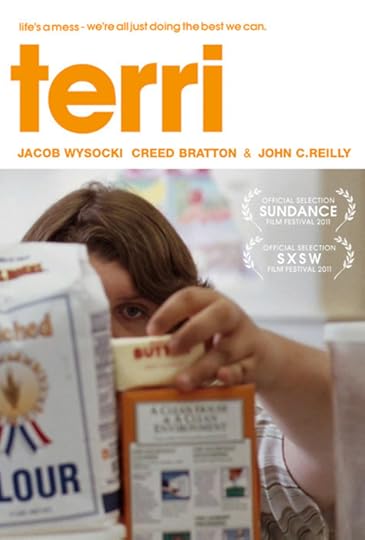
I decided to celebrate a successful end to Script Frenzy by attending a special screening at the San Francisco International Film Festival. My friend Azazel Jacob's new film Terri was a festival favorite, and I was really looking forward to seeing it. Aza has a keen talent for taking a slice-of-life experience and transforming it into pure cinema. Thus, Aza's new film Terri did not disappoint.
It's a coming-of-age story about an awkward high school student (Jacob Wysocki) who wears pajamas to school and struggles to find a place among his fellow students. When Terri is dubbed an at-risk student, vice principal Mr. Fitzgerald (John C. Reilly) reaches out and the two of them form an unexpected friendship.
The film is uncomfortable to watch at times. The absence of Terri's parents, his ailing uncle, and his lack of friends—it's a lonely portrait of a young, aimless, relentlessly teased, insecure teenager. Yet, the bond formed between Terri and Mr. Fitzgerald offers poignant, lighthearted, comedic moments that pump hope into Terri's life.
The movie is reminiscent of a John Hughes film minus the teen caricatures, bold soundtrack, and "The Brat Pack." I really enjoyed Pretty in Pink, The Breakfast Club, and Sixteen Candles when I was growing up, but in some ways, I actually prefer Azazel's take on those awkward teen years because of the film's sincerity. Terri is due to be released in theaters in June, and was an Official Selection of the Sundance 2011 Film Festival.
The Unsung Heroes of OLL Events

I'm going to be traveling to Pennsylvania this week to speak at Mercersburg Academy. I'll be talking to the high school students there about the life-changing benefits of high-velocity prose.
I'm really looking forward to the visit. I've always felt that the thousands of high school students who take part in NaNoWriMo and Script Frenzy are the unsung heroes of the events. High school was the most hectic time in my life, and the fact that so many high schoolers bash out a novel or script while going to class, doing homework, taking part in extra-curriculars, applying to colleges, and dealing with pressures from family and friends is an inspiring testament to the fact that you can be busy and still find time to write.
In the comments, I'd love to hear from high school students who have taken part in Script Frenzy and NaNoWriMo. What advice would you give to another high school student tackling either event for the first time?
And to the students of Mercersburg Academy—I look forward to meeting you in the chapel on Friday.
– Chris
Photo of the somewhat terrifyingly large chapel where Chris will be speaking courtesy of Flickr user EdSocialmedia
Chris Baty's Blog
- Chris Baty's profile
- 63 followers



